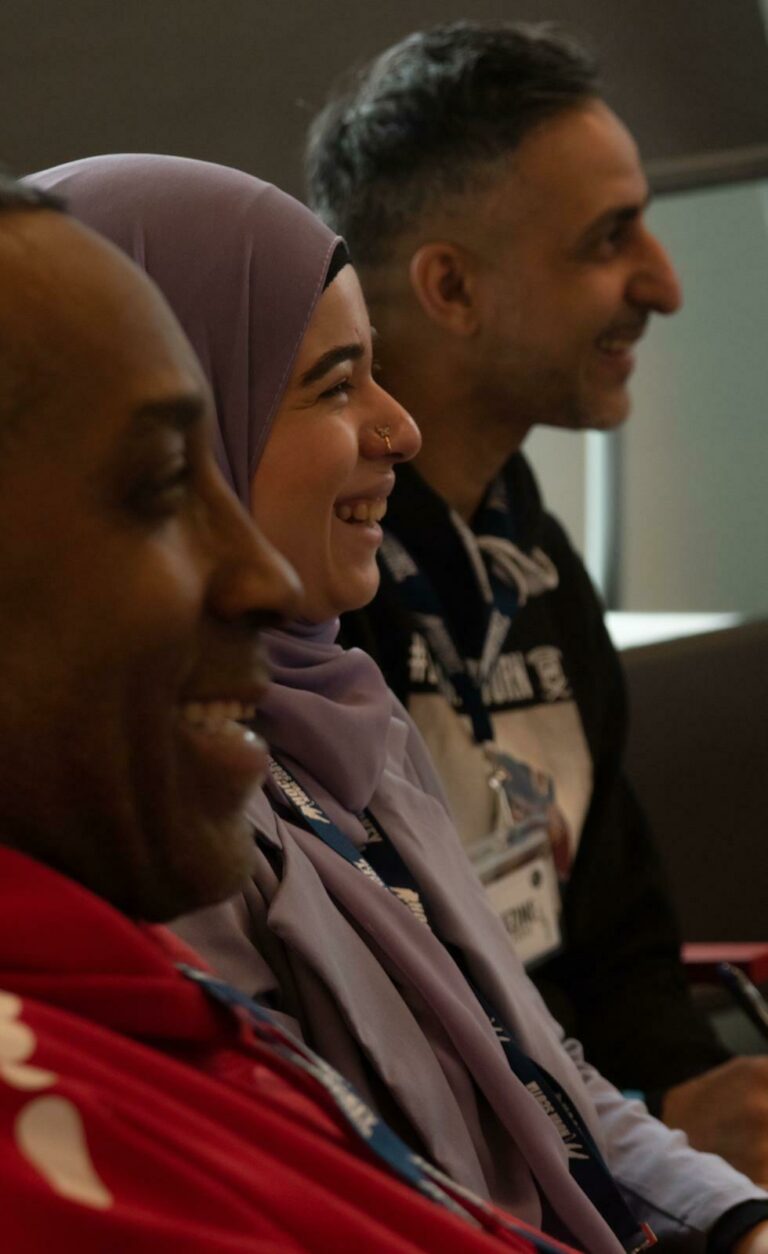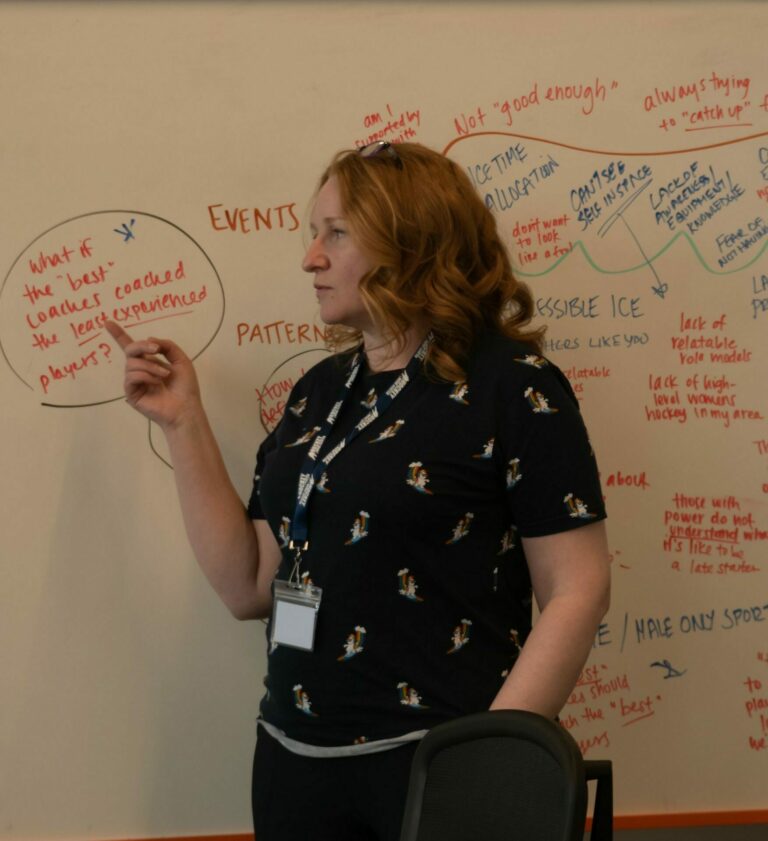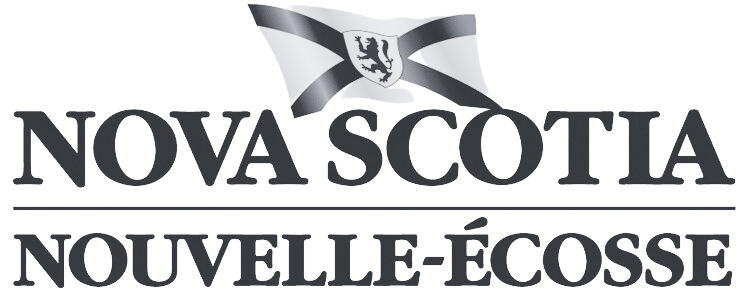Written by Denise Withers
After weeks of testing out two different ideas to grow gender equity in the game, the Fresh Ice team was out of time. Their big pitch to the FHL's Board of Mentors and Advisory was less than a week away and they had to choose which concept to go with.
It was a tough call. Moe Hasham was already having success working with schools nationwide to introduce kids to hockey. So that could be an option. But, as long-time equity leader Teresa Joudrie tells us, the team knew in their hearts that they'd have to come up with something far more radical if they wanted to make a real difference long term.
“As we've gone through the activities, one of the things that I think I've brought to the table is that focus on, ‘What does radical look like? What is the true problem we're trying to solve?’ There are a million solutions. But how do we really flip the switch?”
As part of the 2023 cohort at the FHL, the eight Fresh Ice team members had signed up to tackle the question of how to break down barriers to radically accelerate opportunities for girls, women and gender-diverse people across the sport of hockey.
For this group, that meant figuring out how to create a safe space for kids and parents to experience hockey.
Why does a safe space matter? In this case, it all comes down to belonging and feeling included. Hockey is a key part of the Canadian identity. Not knowing how to play or even skate can be socially isolating. And, despite all the work being done across the country to try to create equity and inclusion, the game is still dominated by white, straight, able-bodied boys who start hockey before kindergarten. Anyone of a different colour, gender identity or ability continues to be pushed to the sidelines.
Fresh Ice team member Reshmi Bisessar has felt the sting of exclusion and loss that come from being different. As a person of colour, she moved to Canada at the age of 14. Though she had played many sports back in England, none of those games was available here. And learning something new, especially something as daunting as skating or hockey, just seemed too risky. So, when her friends went skating, Reshmi stayed home. Eventually, she dropped out of sports altogether. Years later, when her son fell in love with hockey, Reshmi saw the same thing happening to him.
"We live in deep Scarborough and he was one of two biracial kids on his house league team. And if the team wasn't full, then these rep (competitive) kids would come and play with them. They were all upper-middle-class white kids because that's who has the money to put their kids in sports at that level. And my son wasn't getting a lot of ice time because these rep kids were there in the house league. It made me sad because kids like mine, they want to play and get better. But they're not having that opportunity. They're not being coached in a way that will help them excel in the game and skill up."

As a self-identified "loud and proud" hockey parent, Teresa is committed to taking action because they can. They've seen firsthand the potential power of a hockey culture that welcomes gender diversity in Yellowknife – and the devastating impacts of one that doesn't in rural Canada.
“In my son's second year of hockey in Nova Scotia, there was an incident where one of the kids outed another in front of his team. And it was atrocious. For me as a parent and a board member of the local hockey association, it was extremely frustrating. So I started talking about potential policy changes and made it very explicit that governance needed to be stepped up and we needed to do a lot more around inclusion – not just for queer kids, but for all kinds of folks. I also saw that the girls were also getting short-shifted. Whether it came to changing in the broom closets or just getting on the ice, they were considered second-class citizens. We needed to find ways to change the system from the inside. Because if the policies aren't there, if the education isn't there, if the awareness isn't there, it's a bust.”
During their time together, the Fresh Ice team realized that success for them wasn't about producing winners and league champions. They wanted everyone to feel like they belonged in hockey and that hockey could belong to them. To do that, they knew they'd need to create a gateway to the hockey world that melted away financial, cultural and physical barriers – like cost, access to ice and equipment, and not knowing how to skate, shoot and or even get dressed. Most importantly, as Teresa reminds us, it needed to melt away fear.

“If you’re walking into the rink for the first time and you're 10 years old, it's intimidating. Walking into the rink with my kid, I was scared. I was scared for them and I was scared for myself because I hadn't been part of the hockey culture until later in life. We need to demystify that for kids so that they see, ‘Oh, this is what the hockey experience is. This is what a changing room experience is. This is what an on-ice experience is.’" - Teresa/TJ Joudrie
Working with Alex Ryan, their innovation coach, the Fresh Ice team used techniques like personas and prototyping to really zero in on who they wanted to help the most and what would have the most impact.
That's when they had their big idea. They could use virtual reality (VR) in schools and recreation centres to let older kids (12 and up) try out every part of hockey from the safety of a classroom or gym. In the VR game, kids could create their own avatars, make their own teams, choose the locker room that makes them most comfortable, practice putting on equipment and learn to play just for fun.
By tapping into technology that's readily available and already used for training by the pros, the team hoped to create a unique hockey culture and experience without any intimidation or other barriers. It would give kids the know-how and the confidence to show up at a rink in the real world and feel like they belong.
Over the next few weeks, they presented their idea to different groups – including a diverse audience at the Future of Hockey Forum – to collect feedback and fine-tune their pitch. After six months of work, they recently won $5,000 from the FHL to figure out how to take it to the next level.
While they're thrilled at the success they've had so far, as Teresa tells us, the biggest payoff for them comes from opening doors for others.
“If you're someone who can't ever make it onto the ice, you can still feel like you're part of the sport with VR because it includes that team connection piece. And if you have a positive team environment, that can change the trajectory of how you view your life.”

But the FHL experience also brought the Fresh Ice team members something else, perhaps even richer, that they didn't expect – their own sense of belonging. Working together, sharing stories, trying, failing, learning and growing as a team for five months fostered a surprisingly powerful bond across provinces, generations, cultures and backgrounds.
"The relationships that I've formed with these people have been amazing," Reshmi shares. "If I put something out on our comms channel and say, 'Hey, is anybody around for a chat?' somebody will be there. I feel like I found my people – folks who are like-minded, indignant about the injustice in the world and say, 'Hey, if we have an idea, we can make things happen.'"
It turns out that a core benefit of doing this work as a cohort isn't just coming up with better ideas. This kind of collaboration also builds much-needed innovation capacity in a society that's stuck in the past. In particular, it develops the ability to learn by doing.
Reshmi continues. "There were some people in the lab who had never done anything like this. They just were passionate about hockey or their kids played. And I think it opens up your mind to the reality of what people can do if they put their minds to something. Because the whole point of the lab is that we're doing, right? We're not just talking. It shows the power of people who see the need for change and want to do that. Look what's happening with the professional women's hockey league. And we need to think more about those sorts of things as we move forward because the world is kind of shitty right now. And I think you have to get involved in organizations that are doers rather than talkers because doing is where the magic happens.”
Though the journey to create an accessible gateway to hockey with VR is just beginning, the Fresh Ice team is excited about its broader potential for social change.
Helping youth develop the confidence to navigate hockey culture does more than just foster belonging and inclusion in the game. It also shows kids that, if they can find belonging in this often toxic, scary space, then they can also find it in other spaces that aren't currently accessible to them. Plus, falling in love with hockey through virtual reality will allow them to develop all the other life and leadership skills that come from playing team sports.
Looking ahead, the team continues to be inspired by the work of all the other changemakers in the Future of Hockey Lab and the hockey community. And they realize that this is just the beginning. Their only limit is their imagination.
"I have dreams where I can skate comfortably and beautifully and I never fall," Teresa tells us. "If I could see myself playing VR hockey and feeling the experience – not NHL Hockey on the Xbox or whatever – but me playing with people that were like me, that would be incredible. But if I could see the kid who was scared to go to the rink actually show up at the rink because they knew the system and understood the rules well enough to get on the ice, that would be game-changing."



